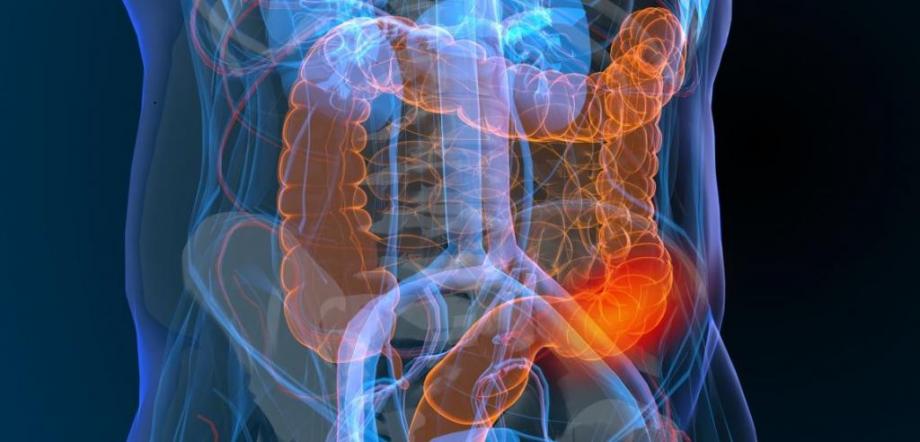The study, from the Wellcome Sanger Institute, Cardiff University and collaborators, found that individuals with two mutated copies of the gene, one from each parent, had increased mutation rates in healthy intestine cells, causing pre-cancerous growths with an even higher number of mutations. The results of this research imply that the higher mutation rates in healthy tissues are likely to be responsible for the increased bowel cancer risk in these individuals.
The research, published earlier this month (8 July 2022) in Nature Communications, also found mutation rates were modestly increased in blood cells from affected individuals but these are not known to be linked to any increase in risk of blood cancer development, highlighting that there may be other factors or mechanisms protecting these tissues.
Understanding why a mutated MUTYH gene gives an increased cancer risk, particularly of bowel cancer, could lead to new ways to prevent and treat the disease. Plus, the discovery of a link between the rate of mutations in the blood and intestine suggests this could be investigated to produce a blood test to help predict bowel cancer risk.
Bowel cancer, also known as colorectal cancer, is the fourth most common cancer in the UK, with around 42,300 people diagnosed with the disease in the UK each year1.
While the cause of cancer is due to a range of different factors, some inherited mutations can lead to an increased risk of developing disease. The gene, MUTYH, is involved in the DNA repair pathway following oxidative damage. Inherited mutations in the MUTYH gene lead to a syndrome known as MUTYH-associated polyposis (MAP), which results in growths known as polyps in the large intestine and an elevated risk of early onset colorectal cancer2.
The progression from inherited mutations in the MUTYH gene to the development of bowel cancer is not fully understood. In this latest study, Wellcome Sanger Institute researchers and their collaborators from Cardiff University analysed intestinal tissues and blood from 10 patients with MAP, and found that there was a considerably increased rate of mutation in the healthy intestinal cells. At one extreme, a sixteen year old with MAP had the same number of mutations in his healthy intestinal tissues as would be expected if someone without MAP syndrome had lived to 455 years old.
They also found an increase in mutation rate in peripheral blood cells, which are those circulating in the blood. The rate of mutations between intestinal cells and blood cells was positively correlated, suggesting that one day this might be used to stratify bowel cancer risk through a blood test.
In addition, they identified two patterns of mutations, known as mutational signatures, that have been found in individuals with bowel cancer that was not linked to an inherited MUTYH gene mutation, adding to current understanding about the cellular changes linked to the development of this disease.
Further research is needed to shed light on why the bowel is particularly susceptible to cancers in this condition, and if there are ways to target the MUTYH mutation or the downstream mutations in the development of new treatments.
Dr Phil Robinson, first author and Wellcome Clinical PhD Fellow at the Wellcome Sanger Institute, said: “This is an exciting development in our understanding of the inherited causes of colorectal cancer. Studying healthy cells from individuals with inherited cancer conditions opens a window into the mutational processes responsible for cancer development and is helping us to better understand cancer risk. By gaining a deeper understanding about these processes, it may help us to predict the risk of colorectal cancer in those living with this genetic condition and potentially identify treatments for at-risk individuals.”
Professor Julian Sampson, author and Professor of Medical Genetics at the University of Cardiff, said: “Understanding the genetic basis of cancer can lead to new targeted interventions for prevention and better treatment. This research represents an important step in understanding cancer development in people affected by MAP and also helps to explain why cancer risks vary between different people with MAP, paving the way for a more personalised approach to cancer surveillance.”
This study also supports previous work showing that normal cells can handle more mutations than thought, and that increased mutation burden alone is not responsible for the ageing process.
Professor Sir Mike Stratton, senior author and Director of the Wellcome Sanger Institute, said: “Our research has shown that the mutational burden of cells is a really important factor that leads to certain cancers, in this case colorectal cancer in some individuals. The mutational signatures identified have been previously linked to other cancers, suggesting research into these and how they arise with a mutated MUTYH gene could be applied to a wider number of cancers. This research also adds to the ongoing conversation about the causes of ageing, supporting earlier work that suggests that mutational burden alone is not to blame for age related disease, and understanding the factors at play could lead to great insight into how to protect against these diseases, including cancer.”
Image: courtesy of Wellcome Sanger Institute



